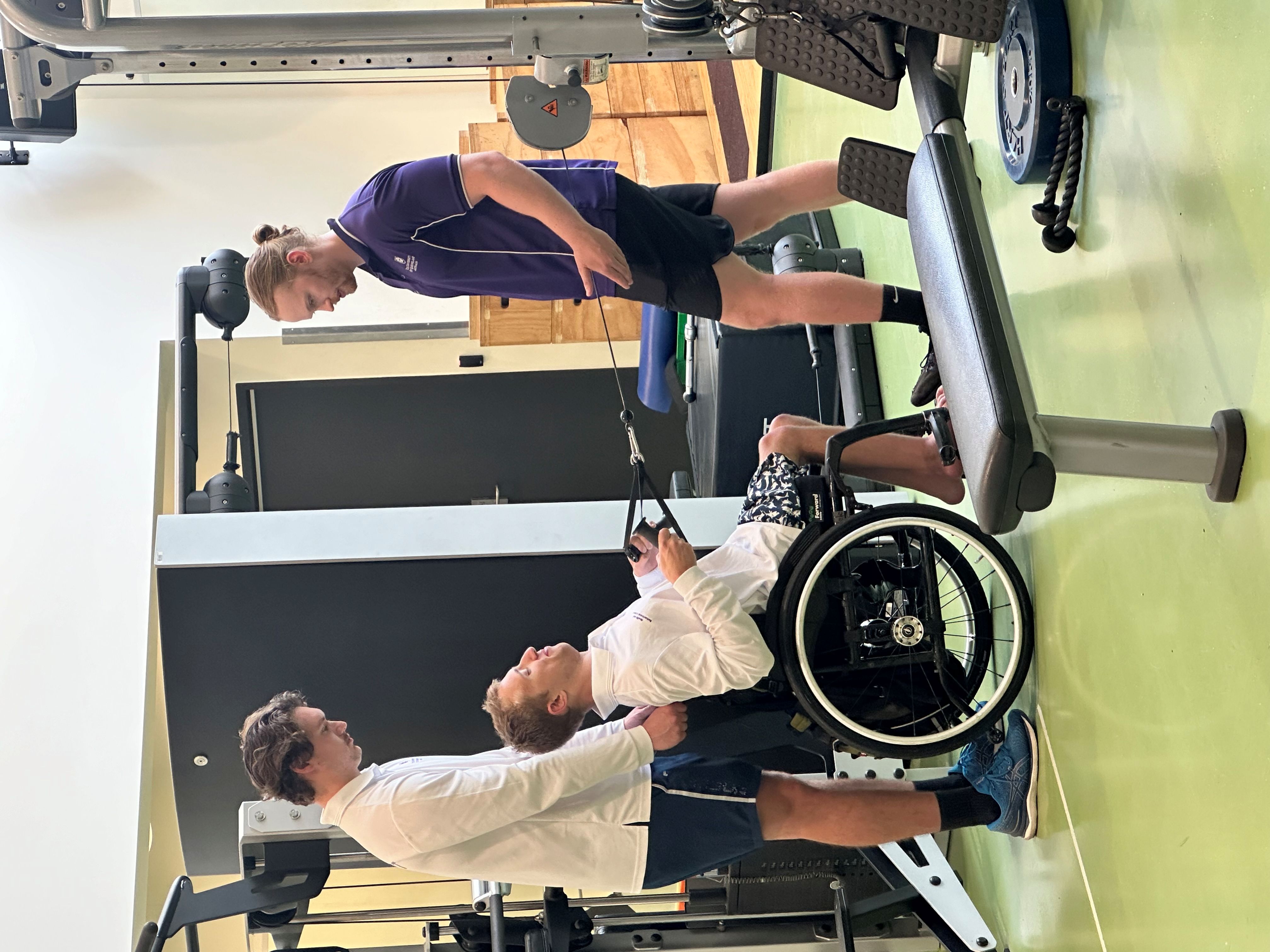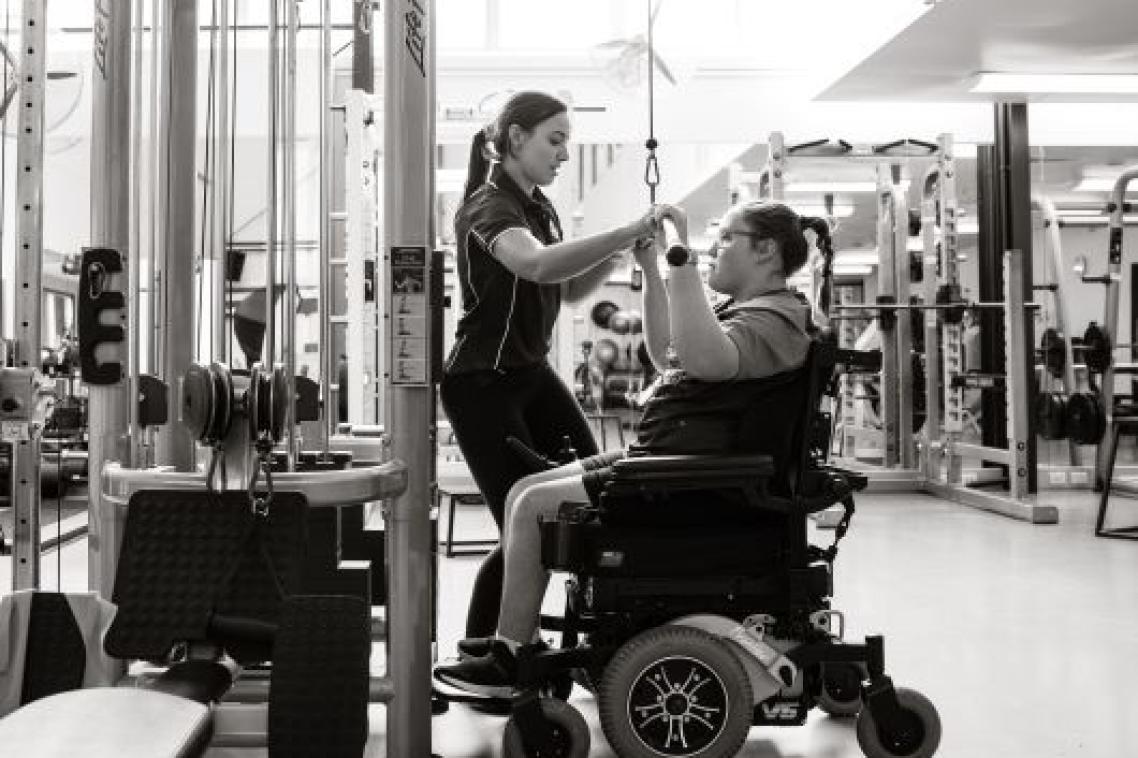Brisbane woman runs 50km for 50 days to break barriers for para-athletes
Dr Jessica Hill is taking on the 50x50x50 Challenge to support UQ's ParaSTART, a performance-based sports training program for people with high support needs.
(Photo credit: The University of Queensland. )
Dr Jessica Hill knows better than anyone the struggles young athletes with disabilities face in sport.
Growing up with 4 autistic siblings, 2 with high-support needs, the paediatric occupational therapist from The University of Queensland’s School of Health and Rehabilitation Sciences, has spent her life witnessing countless setbacks in their efforts to participate.
“I’ve watched my brother try Taekwondo but never move up a belt, I’ve seen my sibling’s playing soccer or football but never getting off the bench,” Dr Hill said.
“It’s been difficult watching the challenges they’ve experienced of trying to access mainstream sport and eventually losing all motivation and confidence because they’re not supported enough to be included in the team.”
Dr Hill is a researcher with a UQ longitudinal study called Para START, that aims to understand whether performance-focused sports training improves clinical outcomes for people with severe disabilities.
Launched in 2017, the study began with 3 young people with severe cerebral palsy and high support needs who had never swum previously.
The program focused solely on competitive swimming.
Eight years later it has retained every athlete and has now expanded to include track and field events, with 47 participants who have a range of conditions including cerebral palsy, spinal, stroke and brain injuries.
“Para START is a groundbreaking study,’’ Dr Hill said.

“It has been the first scientific study to demonstrate that gross motor function improves when adolescents with severe cerebral palsy and high-support needs engage in physically demanding, competitive swimming training.
“Sport is incredibly culturally important in Australia, and participation is beneficial to everyone.
However, it is often overlooked as an option for people with disabilities, especially those with high-support needs.
“Grassroots sport isn't always easy for people with disabilities, but for many it has the potential to have just as much, if not more, impact on their health and wellbeing as 1-on-1 therapy.’’
A path to the Paralympic Games
The Federal Government has committed to increasing the number of people with a disability participating in sport to half a million people in the lead up to the 2032 Olympics and Paralympic Games in Brisbane.
Dr Hill is determined to create supportive environments for aspiring para-athletes.
"Currently, out of Australia's 5.5 million people with disabilities, more than 400,000 have significant support needs,’’ she said.
“For our athletes with high-support needs, when they come in for their daily or weekly training it takes a lot – even getting to training is an effort.
“It can result in a lot of fatigue and pain, which is why I want to raise awareness.’’
Making change
Dr Hill is backing her words with action, committing to make a difference for athletes with disabilities with an awareness campaign with an incredible physical challenge.
In what she has dubbed her ‘50x50x50 Challenge’, Dr Hill will run 50km a day for 50 consecutive days, while aiming to raise $50,000 for Para START.
“The 50x50x50 challenge is my way of making sure those 400,000 individuals aren't overlooked in that goal," Dr Hill said.
"Running 50 kilometres for 50 days in a row is hard, but after 50 days that challenge will stop.
“For people with disability with high support needs their challenges accessing sporting opportunities continues.”
“The challenge isn’t only about fundraising for sporting equipment; I want to put the spotlight on the work these athletes put in to succeed against the odds.’’
In preparation for the challenge, Dr Hill’s focus has been on weight training and she is currently running up to 140 kilometres per week.
It’s not the first time she has undertaken a mammoth effort to inspire change.
Taking the first step
Dr Hill's running journey started at pre-school, and she hasn't stopped since.
Reflecting on her earlier days as a runner, it was the low barrier to entry that drew her to the sport.
“That's why I initially fell in love with running, my family didn't have a lot of money as I was growing up due to my siblings’ supports needs, so I wasn't able to play team sports,” she said.
Dr Jessica Hill running the 100km Noosa Ultra-Trail earlier this year.
(Photo credit: Noosa Ultra-Trail.)
Dr Hill’s running evolved from 100 to 200 metre sprints to gruelling endurance races that have spanned more than 15 years.
This year she has completed the 100km Noosa Ultra-Trail, the Brisbane Marathon, and over 2 consecutive days in July when she completed a Brisbane trail ultra event called The Guzzler - The Glass Half Full 50km, and the inaugural 42km Jetty 2 Jetty Fun Run.
"If you can get a pair of running shoes and you've got a safe space to run, you can get engaged with running,” Dr Hill said.
The 50x50x50 Challenge will take place in various Brisbane locations, starting at UQ Sport Athletics Centre Track on 1 November.
Second image from left: Para START launched in 2017 to understand whether performance-focused sports training improves clinical outcomes for people with severe disabilities. The University of Queensland.
Topics
Related articles

